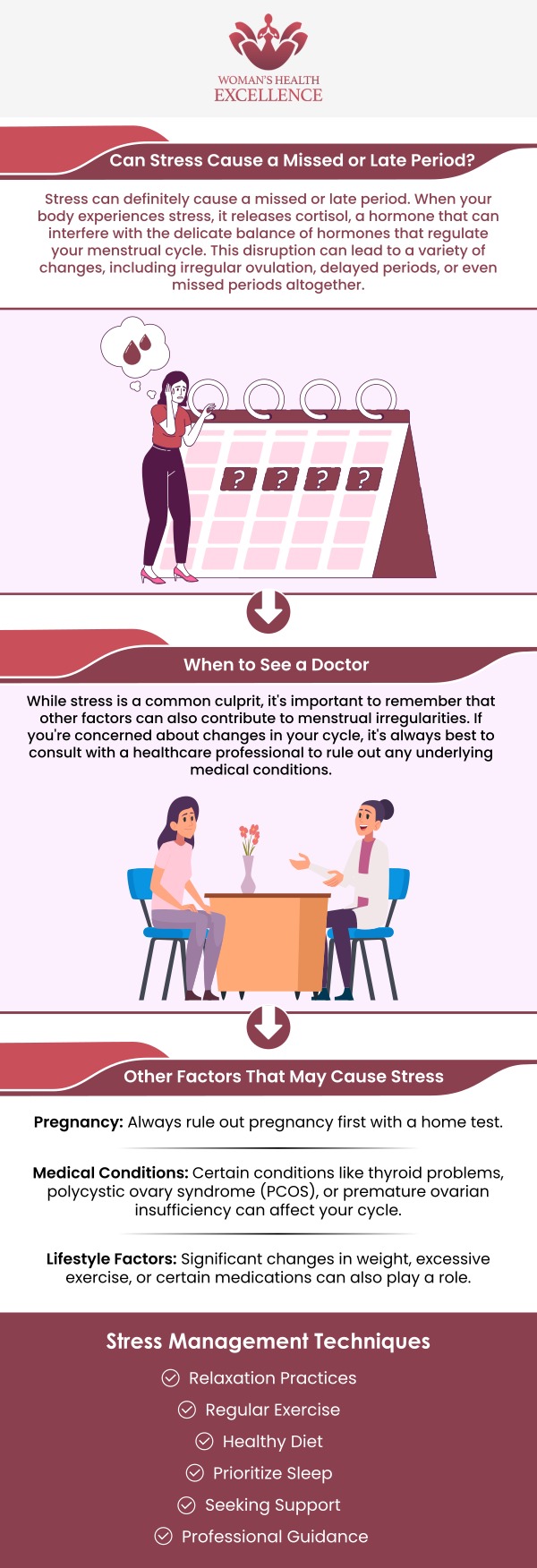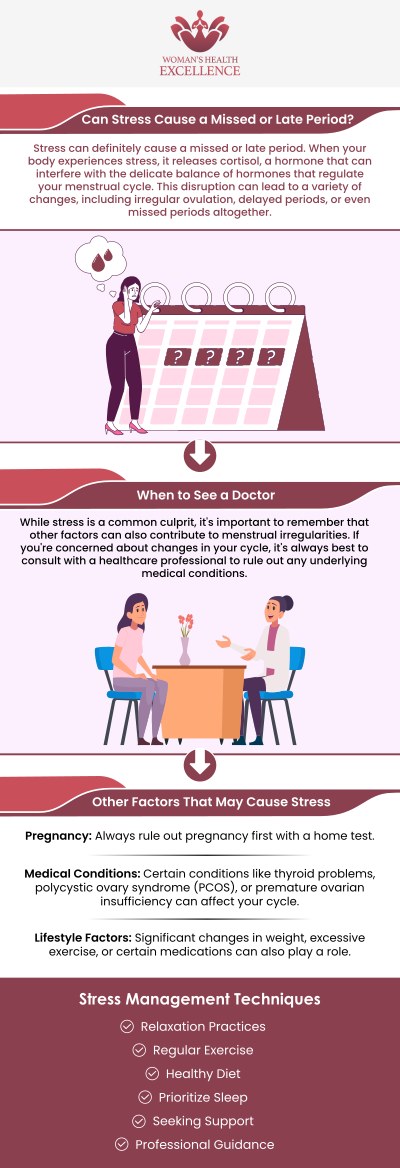Can Stress Cause a Missed or Late Period?
Stress can cause irregular periods and changes in the way you menstruate. This includes missing or delayed periods. If you suspect that stress is interfering with your menstruation, consider ways to relax and adopt lifestyle adjustments. Consult Dr. Prema Kothandaraman at The OB-Gyn and Incontinence Center to help you manage the effect of stress on your periods. For more information, contact us today or book an appointment online. We have convenient locations to serve you in Arcadia, CA, and Glendale, CA.




Table of Contents:
How long can stress delay your period?
Is it normal to miss a period and not be pregnant?
How can I get my period back after stress?
What happens if your period is late due to stress?
High levels of stress can quickly cause physical symptoms when left unmanaged, affecting your general health and leading to symptoms such as fatigue, frequent headaches, and even hormonal changes. Many people may not even realize the physical toll their heightened stress levels are causing until the hormonal changes lead to late or missed menstrual periods.
Short-term periods of significant stress can lead to a delayed menstrual period for several days, often allowing the period to commence once the stress has subsided. For longer-term or chronic stress, the menstrual period can be delayed by much longer or even just missed entirely for a month or for several months. It is common for those suffering from significant levels of stress that endure long-term to experience very erratic and inconsistent menstrual cycles. Experiencing significant stress affects our hormones, which for those who were assigned female at birth means that the regular menstrual cycle can quickly become askew, causing changes to ovulation and period timing. Stress will not cause someone to permanently miss their periods, but if you have gone 6 weeks or longer without having a period, it is recommended that you seek medical attention to ensure there are no other causes for the changes in your cycle.
It is fairly common for women of childbearing age to experience inconsistencies in their menstrual cycles, causing them to have late or missed periods due to a variety of reasons that have nothing to do with pregnancy. External factors such as stress or anxiety will have an impact on hormone levels, leading to irregularities in menstrual cycles. Other factors that have an impact on a regulated menstrual cycle include taking hormonal contraceptives, experiencing hormone imbalances, undergoing a significant change in weight, and suffering from particular health conditions. With all of these potential factors in mind, while around 25% of women experience irregularities of their menstrual cycles while of childbearing age, it is important that medical attention is sought to ensure that the proper care and treatment is received in cases where the patient’s health is at risk.
If you are someone who experiences changes in their menstrual cycle due to high levels of stress or anxiety, the most effective way to allow your cycle to return to normal is to learn coping strategies that work for you to manage the stress or anxiety directly. If possible, eliminating the source of stress will likely allow the body to rebalance hormones and thus allow for all systems to continue functioning properly. However, eliminating sources of stress is rarely an option, so it is important even just for your general health, to find effective coping strategies and mechanisms that work for reducing stress, whether that is found through therapy, engaging in activities that help to manage stress (such as meditation, regular exercise, or music), or taking prescribed anti-anxiety medication will allow your body to return to regularity and can return your menstrual cycle back to normal. Maintaining a healthy sleep schedule is also very important in managing stress levels, allowing for the menstrual cycle to normalize as well.
High levels of stress lead to increased levels of cortisol production in the body which can lead to delayed or missed periods. Having high levels of stress be sustained over long periods of time is not good for any aspect of your health, and can lead to longer-term health problems and increased risks of developing health conditions. Managing stress levels is essential in supporting your body’s ability to maintain equilibrium and to continue functioning properly. When several periods have been missed or you have gone longer than 6 weeks without a period, it is highly recommended that you seek medical attention to rule out any underlying health conditions as there are so many reasons one may be experiencing changes to their menstrual cycle other than stress. Diagnosing stress as the culprit for delayed or missed periods is often done by ruling out all other potential causes, so if you are experiencing significant levels of stress and an irregular period, managing your stress levels, in general, will help to determine if more medical care is required.
Changes in your menstrual cycle that are irregular may indicate significant health-related issues. Have an examination with a competent doctor Dr. Prema Kothandaraman at The OB-Gyn and Incontinence Center to know the actual cause and the right treatment plan for the condition. For more information, contact us today or book an appointment online. We have convenient locations to serve you in Arcadia, CA, and Glendale, CA. We serve patients from Arcadia CA, Glendale CA, Monrovia CA, Pasadena CA, Los Angeles CA, Burbank CA, and surrounding areas.


Additional Services You May Need
▸ Urogynecology
▸ Minimally Invasive Gynecology
▸ Monalisa & Medical Aesthetics
▸ Bioidentical Hormone Replacement Therapy
▸ Urinary Incontinence
▸ Pelvic Organ Prolapse
▸ Painful Bladder
▸ Urinary Tract Infection
▸ Genitourinary Syndrome of Menopause
▸ Female Sexual Dysfunction
▸ Urinary Retention
▸ Vaginal Laxity & Prolapse
▸ Postpartum Pelvic Floor Problems
▸ PCOD
▸ Bladder Prolapse Repair
▸ Urgent PC
▸ Fibroids
▸ Excessive Bleeding
▸ Pelvic Pain
▸ Birth Control & IUD
▸ Vaginal & Pelvic Infection
▸ Monalisa Touch
▸ STD
▸ TempsureVitalia
▸ Biote Pellet Therapy
▸ Topical BHRT
▸ Flexsure
▸ Rectal Prolapse Repair
▸ Tempsure ENVI
▸ Minimally Invasive Pelvic Surgery for Incontinence



